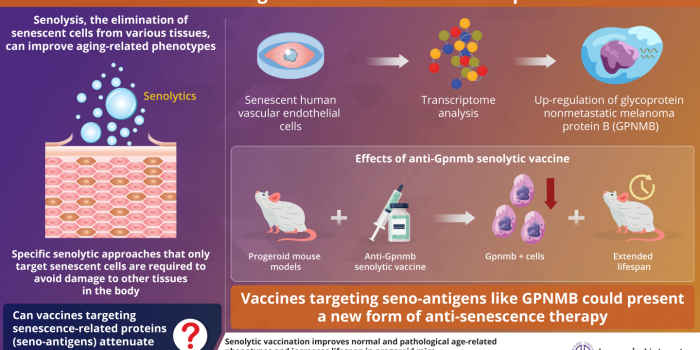In a new study, researchers in Japan have identified a protein specific to these cells and developed a vaccine that can delay aging, with tests on mice reducing the effects of aging.
Cells cannot keep dividing forever – eventually, they accumulate too much DNA damage through environmental stress, so the body shuts them down and flags them to be cleared out by the immune system. This seems to be an evolutionary defense mechanism against cells turning cancerous.
Even immune cells aren’t immune from this process, and as they become senescent themselves the immune system gradually loses the ability to clear out senescent cells. As these inactive cells accumulate in the body, they contribute to symptoms of aging and the diseases that come with it.

Scientists have been experimenting with a new class of drugs called senolytics that clear these defunct cells, which have shown promise in slowing down the effects of aging and increasing lifespan and healthspan.
By examining gene expression in senescent cells, the team first identified a protein called GPNMB, which is expressed in high levels by these defunct cells. This protein was also detected in high levels in patients with atherosclerosis, which is linked to senescence.
Next, the researchers tested what happened when GPNMB is removed. The team fed mice a high-fat diet to speed up senescence, then genetically eliminated cells that expressed GPNMB. Treated mice had fewer metabolic abnormalities and other molecular markers of aging, as well as less severe symptoms of atherosclerosis than control mice.
The team developed a peptide-based vaccine that could target the protein and induce the immune system to destroy cells that expressed it. This was then tested in three groups: young mice on a high-fat diet, middle-aged mice, and mice with an accelerated aging disease known as progeria.

The high-fat-diet mice had better metabolic function than mice on the same diet that didn’t receive the vaccine. Middle-aged mice that were vaccinated at 50 weeks of age remained more active and had faster movements by 70 weeks than control mice. And vaccinated mice with progeria had a significantly longer median lifespan than unvaccinated animals, with the effect more pronounced in male mice.
“Our study has demonstrated the possibility of a new anti-senescence strategy,” said Professor Tohru Minamino, corresponding author of the study. “We speculate that there are many more seno-antigens that are produced by other kinds of senescent cells. With more research, we will be able to provide individualized anti-senescence therapy for patients depending on the prevalence of different types of senescent cells in their body.”
The research was published in the journal Nature Aging.


